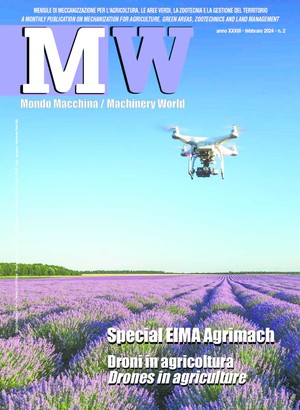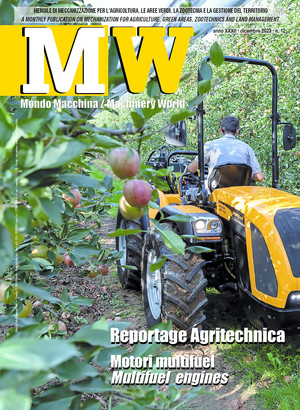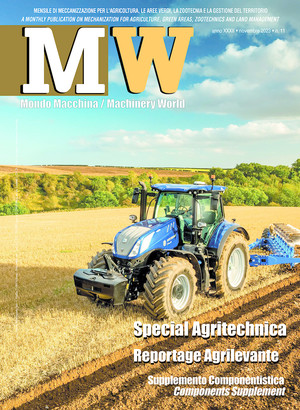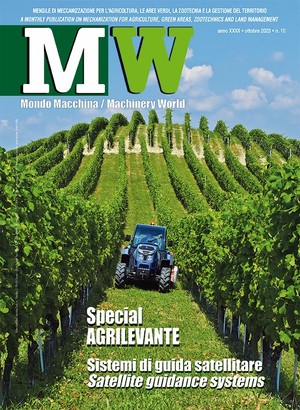Agriculture
The development of the agricultural sectors demands synergistic policies
10.07.2024
A strong synergy between industry, agriculture and the trade and services system. This is the way to strengthen the agro-industrial Made in Italy and to face the new challenges of the market. The message was launched during the conference on the theme "Global and regional markets: challenges and opportunities for the agricultural machinery industry", held as part of the annual FederUnacoma assembly (25 June, Zola Predosa Bologna). The agricultural machinery industry - it was explained during the meeting - is affected by all the economic variables that condition the industry and all those that impact agriculture. It must therefore face a complex scenario, characterized in recent years by the costs of raw materials, the costs of energy, and at the same time by the climate anomaly and the low level of agricultural incomes. But the scenario appears even more uncertain today, due to the new geopolitical structures and the new geography of trade. These are the topics discussed by the conference speakers during the meeting. «The double transition and food security are key issues for agro-mechanical companies. However, it must be kept in mind that transition policies with too short time horizons damage the production system. We hope that the new institutions will open a new season focused on the development of business activity, shelving choices inspired by ideological and anti-industrial attitudes", said the vice-president of Confindustria Maurizio Marchesini, opening the proceedings.
FAO Deputy Director General Maurizio Martina spoke about strategies for agricultural development (connected from Rome), recalling the crucial function of the sector in guaranteeing food security, which has become a hot topic again after the COVID crisis and the military conflicts that have broken out recently, but also to preserve natural resources and to ensure the healthiness of production.
Development policies cannot ignore the current economic phase, which - said Gabriele Pinosa, president of Gospa Consulting - is conditioned by the "inflationary awakening". «The phenomenon is determined by a plurality of factors, linked primarily to the decline of hyperglobalization, which is giving way to the regionalization of markets with the consequent reconfiguration of supply chains. But the “inflationary awakening” – explained Pinosa – is also connected to extreme climatic and geopolitical events, to the energy transition, to the new economic model of China and India, and to the inflationary default possible only in conditions of financial repression». In such a complex scenario, Italian companies can still count on the fruitful collaboration and on the strong support of the ICE Agency which, thanks to its branched structure, is capable of operating in a concrete way in the most diverse contexts. «Particular attention is dedicated by the Italian Government and the ICE Agency to the Mattei Plan and the potential that opens up in Africa, a continent that is facing an important transition towards the modernization of agricultural economies. It is essential to organize ourselves together with FederUnacoma and with the rest of the country system (Simest, Sace, CDP and government institutions) - has underlined the president of the ICE Matteo Zoppas - to intercept all the forms of investment that international organizations are planning for the infrastructural development of the African continent of which with foresight this Government has been able to become the leader through the Mattei Plan. Among the priorities identified, the management of water resources and the development of cultivable surfaces, the effectiveness and efficiency of agricultural production through the technological excellence offered by agritech made in Italy, the undisputed leader in the sector at a global level".
FAO Deputy Director General Maurizio Martina spoke about strategies for agricultural development (connected from Rome), recalling the crucial function of the sector in guaranteeing food security, which has become a hot topic again after the COVID crisis and the military conflicts that have broken out recently, but also to preserve natural resources and to ensure the healthiness of production.
Development policies cannot ignore the current economic phase, which - said Gabriele Pinosa, president of Gospa Consulting - is conditioned by the "inflationary awakening". «The phenomenon is determined by a plurality of factors, linked primarily to the decline of hyperglobalization, which is giving way to the regionalization of markets with the consequent reconfiguration of supply chains. But the “inflationary awakening” – explained Pinosa – is also connected to extreme climatic and geopolitical events, to the energy transition, to the new economic model of China and India, and to the inflationary default possible only in conditions of financial repression». In such a complex scenario, Italian companies can still count on the fruitful collaboration and on the strong support of the ICE Agency which, thanks to its branched structure, is capable of operating in a concrete way in the most diverse contexts. «Particular attention is dedicated by the Italian Government and the ICE Agency to the Mattei Plan and the potential that opens up in Africa, a continent that is facing an important transition towards the modernization of agricultural economies. It is essential to organize ourselves together with FederUnacoma and with the rest of the country system (Simest, Sace, CDP and government institutions) - has underlined the president of the ICE Matteo Zoppas - to intercept all the forms of investment that international organizations are planning for the infrastructural development of the African continent of which with foresight this Government has been able to become the leader through the Mattei Plan. Among the priorities identified, the management of water resources and the development of cultivable surfaces, the effectiveness and efficiency of agricultural production through the technological excellence offered by agritech made in Italy, the undisputed leader in the sector at a global level".








